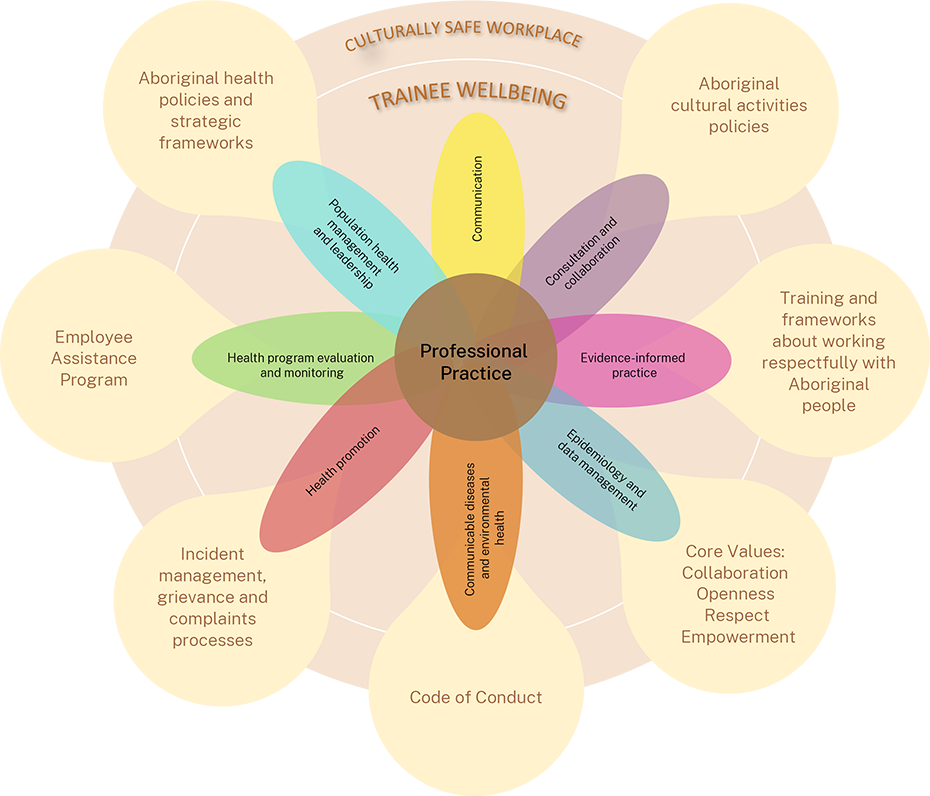Our vision
A workforce in which knowledgeable, skilled, and capable Aboriginal population health professionals drive and influence current and future population health practice, programs, and policies in NSW.
On this page
-
Our intent
-
Our values
-
Why do we do this?
-
How do we do this?
Our intent
We will work to:
- achieve equity in health outcomes between Aboriginal and non-Aboriginal Australians to close the gap by 2031
- ensure widespread collaboration with a range of agencies within and outside of the health sector to promote perspective, experience, and connection
- develop Aboriginal population health professionals who understand the implications of policy at all levels
- enhance the role and significance of Aboriginal population health professionals within the health system.
Our values
- Self-determination for Aboriginal peoples
- Elevated, embedded, and empowered Aboriginal leadership and voices
- Commitment, collaboration, and high-level participation
- Reciprocity and two-way learning
- Cultural inclusion, respect, empathy, and focus on community
How do we do this?
 Text alternative
Text alternative
Trainee wellbeing
Trainee wellbeing is fundamental. This begins by recognising and valuing the knowledge, skills, and experiences that trainees bring to the APHTI. Wellbeing is facilitated by self-determination and incorporates reflective practice within a shared learning journey between trainees and the broader health system. The APHTI encourages and supports self care, which is essential to trainee wellbeing.
Culturally safe workplace
‘Cultural safety’ is the freedom to express our cultural identities and attitudes. It involves being open-minded and flexible in our attitudes towards people from other cultures. Everyone, regardless of culture, needs to be treated with respect and inclusion and needs to have an awareness of other cultures. This requires a united understanding and recognition that individual values and practices should safely coexist in workplaces and the wider community.* We acknowledge that there is currently no nationally agreed definition of cultural safety. In the context of the APHTI, we use it to describe the individual and institutional knowledge, skills, attitudes, and competencies needed to create an environment that is safe for Aboriginal peoples.
A culturally safe workplace respects Aboriginal ways of knowing, being and doing. The APHTI is committed to strengthening systems and processes within NSW Health to provide a workplace where culture and identity are respected and valued. We actively promote acceptance of Australia's cultural, linguistic and religious diversity and challenge prejudiced attitudes. The APHTI is committed to examining its role in creating culturally safe workplaces, including addressing institutional racism, and promoting decision making processes that increase the active participation of Aboriginal peoples and voices.
*Adapted from
What is cultural safety?
Racism
We reject all forms of racism. No one should experience racism within the health environment. Racism is detrimental to learning and practice, and has no place in the NSW health system. We are committed to the elimination of racial discrimination – including direct and indirect racism, racial vilification, and harassment – in all aspects of the working environment.
It is everyone’s responsibility to call out instances of racism and discrimination, to challenge the attitudes that allow them to emerge, and to take appropriate and meaningful steps to eliminate racism.
Population health competencies
The
APHTI competency framework is grounded in contemporary population health practice. The competencies have been designed to support a strong, knowledgeable and capable Aboriginal workforce that can work to protect, promote and prevent ill health within the community.
Like the APHTI, these competencies will evolve with time. We will seek the experiences of trainees and other stakeholders to adapt and strengthen the competency framework in the future. Collectively, APHTI alumni represent a growing cohort of future public health leaders, influencing the landscape and setting the tempo of change in population health practice, programs and policy.
Why do we do this?
Why do we have the APHTI?
The APHTI:
- builds population health workforce capacity
- supports the development of a knowledgeable, skilled, and capable Aboriginal population health workforce
- increases the number of qualified Aboriginal people eligible for population health positions
- increases the population health workforce’s exposure to Aboriginal population health issues
- supports Aboriginal public health professionals to drive and influence population health programs and policies
- increases awareness of cultural safety issues in population health workplaces
- highlights the importance of Aboriginal voices in decision-making processes. This includes incorporating Aboriginal ways of knowing, being and doing in the design, implementation and evaluation of policies and programs to achieve better health outcomes
- values the expertise of Aboriginal people working in NSW Health
- identifies ways to enhance career development for Aboriginal people working in population health in NSW.
Why do we use a competency framework?
The competency framework:
- promotes broad population health training, rather than a focus on Aboriginal health
- focuses on building skills and capabilities
- focuses on developing an adaptive and competent Aboriginal population health workforce
- promotes a flexible and holistic approach that includes trainees in decision-making processes and program delivery
- provides standards and tools to guide learning and assessment
- supports a standardised learning experience for trainees
- values the professionalism of Aboriginal employees and their abilities.
Why do trainees study a Master of Public Health?
The Master of Public Health:
- provides a theoretical framework for population health practice
- complements learning provided in the workplace
- provides the opportunity for expanded professional development through formal learning
- increases the number of Aboriginal people working in NSW Health with postgraduate qualifications in population health.
